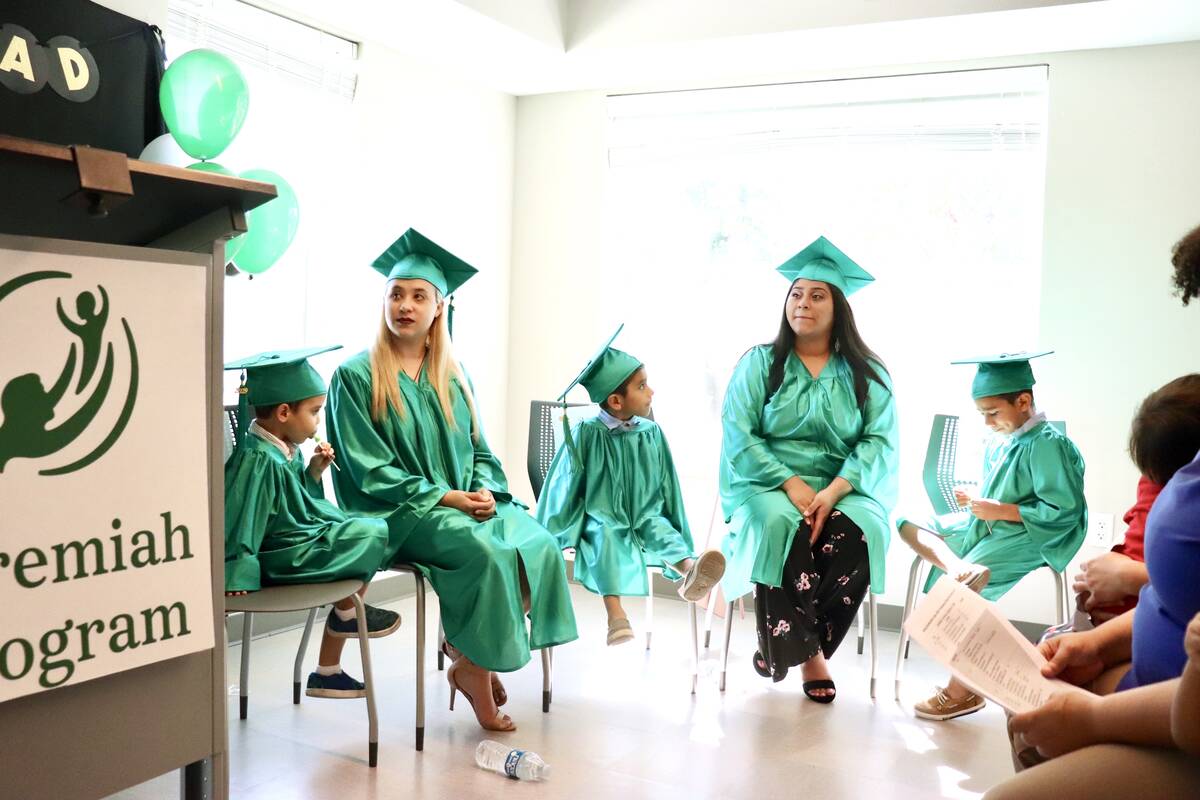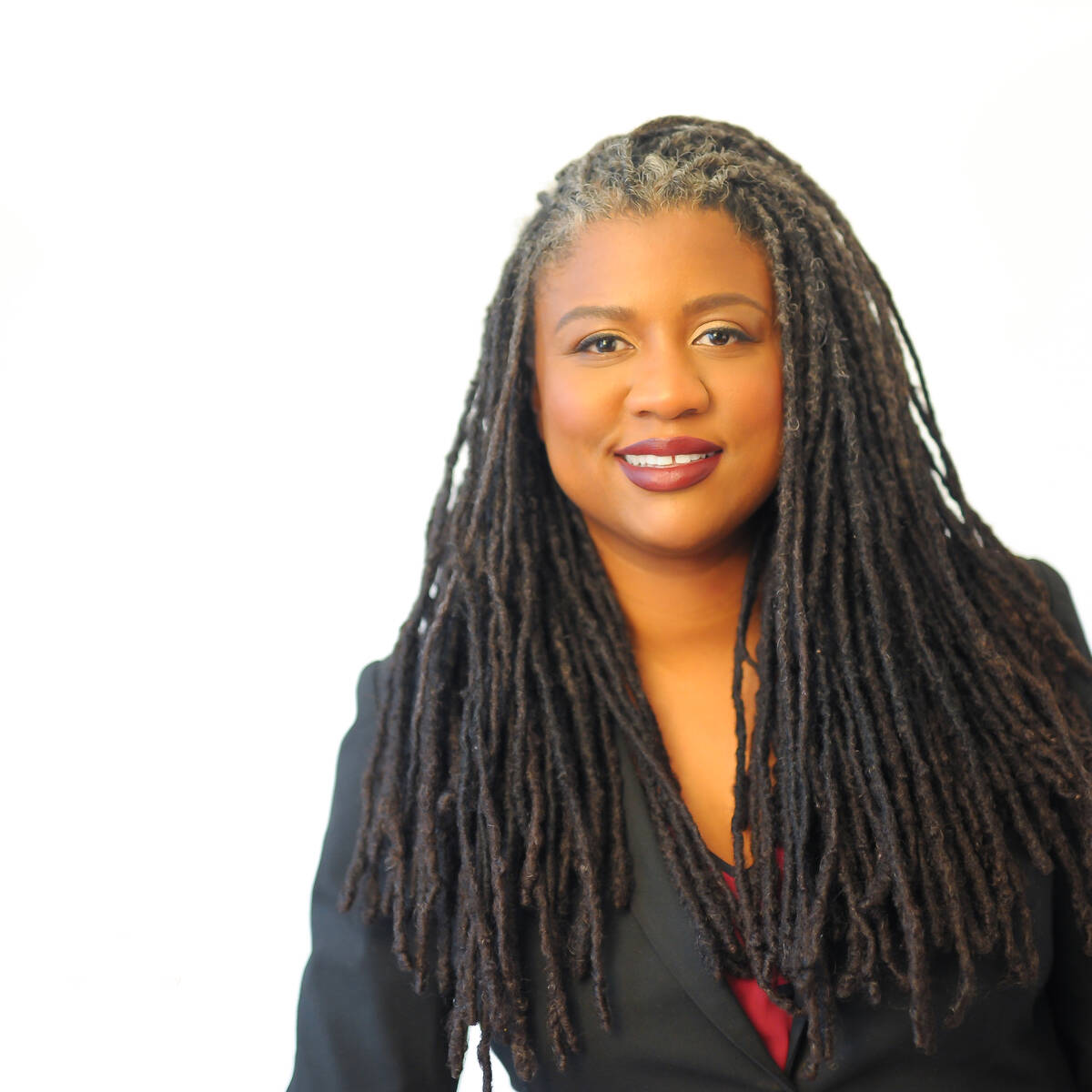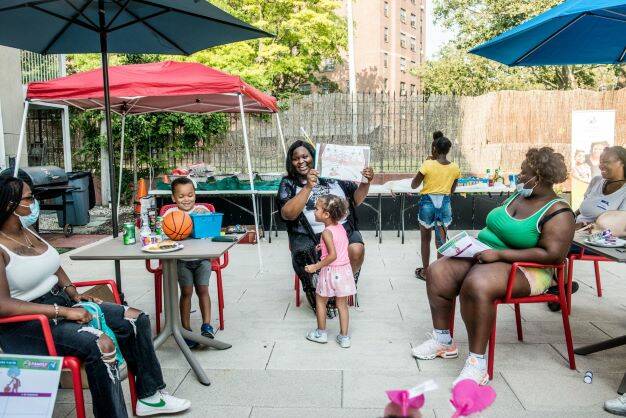National nonprofit now on a mission to help single mothers in Las Vegas
A national nonprofit is bringing its programming to Las Vegas with the hope of breaking the cycle of poverty for single mothers.
Jeremiah Program bills itself as a two-generational approach to supporting women with children by offering them supportive services in housing, familial support, transportation or whatever else is needed as they pursue higher education to improve their economic mobility. It began in Minneapolis in 1993 and has expanded around the country with residential and nonresidential models.
Chastity Lord, president of the nonprofit, said its program in nine cities isn’t reinventing the wheel. Rather, it’s organizing many different education, family and poverty-related services into one spot to cater to single mothers — people who often think of others before themselves.
Jeremiah Program will begin with its first cohort of 100 women and their children this summer. The national team is currently recruiting local executive staff, then potential members will be recruited through partner agencies or can apply directly.
Lord spoke about the nonprofit’s approach, generational poverty and what brought its programming to Vegas. This interview has been edited for length and clarity.
Las Vegas Review-Journal: How does the program find its mothers and children?
Chastity Lord: We partner with a lot of peer organizations in the area. We’re really looking for organizations that work with single moms — whether it’s houses of worship, whether it’s community-based organizations like the Children’s Cabinet — and those organizations nominate prospective JP moms. In addition to that, we also do a pretty robust recruitment where we’ll have ads on the radio, we’ll send out flyers and partner with community-based early childhood centers. The core of our campaign is: You’re a great mom; become a JP mom, too. A little over a quarter of folks in the Nevada area are actually single parents. One out of every three of them live within or at the poverty line. That was census data that doesn’t even fully absorb the pandemic.
The intro to the program is empowerment and leadership. It’s a good opportunity for a JP mom to be kind of selfish in a way that a mom doesn’t oftentimes get a chance to be. She’s gonna meet once a week within a cohort over a 12-week period going through an empowerment and leadership curriculum. It’s an opportunity for her to be in conversation with the woman she is, the woman she’s been, and the woman she desires to become.
At the end of that 12 weeks, the biggest concrete lever that has come out of that is a blueprint for her life. She’s able to take the time to really start to author what she wants her life to look like for her family, but also for herself. She either decides to go immediately back to school or she has six months to make that decision. That’s where her one-on-one coaching happens. That’s also where the support structures around affordable housing, backup child care, mental health resources and all the wraparound programs that are a part of that.
This program bills itself as a two-generational approach. Can you tell me about what programming is like for the child or children?
A couple of things. One is high-quality summer camp options. A great mom will always bet on her child, not bet on herself. So we try to encourage mom to attend summer courses to be able to keep that college debt down. We pay for kids to go to high-quality summer camps. In addition to that, we provide one-on-one tutoring.
We help a mom prepare for her parent-teacher conference. We help a mom understand what are the different developmental milestones that your child should be leveraging as well. We have really robust partnerships. We’ve been partnering with Acelero in the Las Vegas area. We’ll be doing on-site counseling and support services. We provide mental health services for the kiddos as well. It really is reflective of those needs. Anything that’s a barrier to entry for that mom to continue to persist and move along that economic mobility.
What brought you guys to Las Vegas? How did you identify here as a place that would benefit from this program?
We revisited (our) strategic plan a year ago, looking at the pandemic and looking at new paths, new paths of migration and of poverty, and really wanting to have the latest, greatest analysis of what’s transpiring in any particular community. We got even as nuanced on the impact of the pandemic — it’s incredibly high in Clark County. Eighty percent of JP moms are moms of color: 50 percent identify as Black, over a quarter identify as Latinx.
A lot of the jobs have been erased through the pandemic; those that are coming back are coming back as a working wage. There’s opportunity for moms to really align around emerging workforce trends and opportunities that are at play in Clark County. That includes things like the University of (Nevada, Las Vegas), they have incredible work, but they don’t have a lot of structures around supporting families. They don’t have any family housing, those types of things.
In addition to that, some of the work that local community colleges have been doing in the area — a lot of people think that the gaming industry is the dominant industry. There’s a lot of opportunities for moms to on-ramp and retool and get back in, whether it’s Nellis Air Force Base or a host of other opportunities.
I can see how you can be a student at UNLV with a family, but they don’t know that everyone in the class has a kid. It’s not implied that there will be child care for them, or some sort of solution.
Imagine you are a student, a single mom and you’re attending UNLV. Your econ class has a group project that gets you guys together every Wednesday between the hours of 5 to 7 p.m. Schools are not in session. Child care centers are not open. What are you going to do? Where does that money come from? The financial aid award letter you got has housing, books, tuition, maybe transportation. But it didn’t have child care.
Those are the types of levers that make creating spaces for support systems like JP to make sure mom never has to wonder, she doesn’t have to explain. We have structured everything so that you can move from matriculate, persist and graduate.
It’s not a handout. It’s really an acknowledgement that the social safety nets are porous. What we’re trying to do as an organization is to close some of those gaps around the social safety net, and help moms understand that they play a role in reimagining. It’s not just for themselves, but for their families, but also for the community to actually give voice to the fact that, (for example), the local library doesn’t have a changing table. It’s important for them to also influence those unwritten rules that are making it challenging for them to move up the economic mobility ladder.
What is something that might be most misunderstood by the general public about the cycle of poverty?
I would say three things. One, our country understands that there’s a pay disparity among women. We understand that access for women around promotions shows up in traditional white-collar frames. Those same issues and challenges you’re talking about show up in working-class structures. Early childhood child care workers, 90 percent of them are women. Fifty percent of them are folks of color. You can make more at your local barista than you can taking care of (children) during some of the most critical years of a child’s developmental stage. You know why that is? It’s because of who disproportionately holds those roles. Poverty — generational poverty — it’s systemic. It’s complex, but we also have to understand the role of race and the role agenda.
We also have to remember that for generational poverty, we want to engage with it as an economic issue. But the pandemic has really laid bare in this beautiful way how unjust our public educational system is, our health system is, our housing system is. An ecosystem of inequity has shown up. There’s this Audrey Lorde quote that says, “There’s no such thing as a single-issue struggle because we do not live single-issue lives.” If we think that it’s just economic, we’re just playing whack-a-mole and the next thing’s kind of popping up.
Third is the power in the correlation between economic mobility and shame. We actually think there’s a direct correlation between shame in economic mobility. So many of our moms, there’s such shame with this, this identity around being a single parent. They have to start from this place of proving they’re a great mom. You wanna gut somebody? Question the quality of their parenting. JP moms often have to do that over and over and over.
A lot of our moms will just not even on-ramp because it’s overwhelming to have to navigate a system that wasn’t built with you in mind, in addition to also have to respond to a character question with something that’s so vulnerable.
McKenna Ross is a corps member with Report for America, a national service program that places journalists into local newsrooms. Contact her at mross@reviewjournal.com. Follow @mckenna_ross_ on Twitter.





















